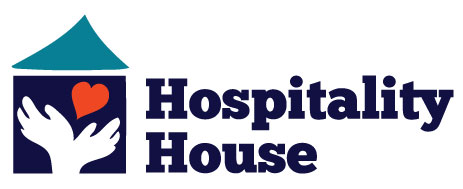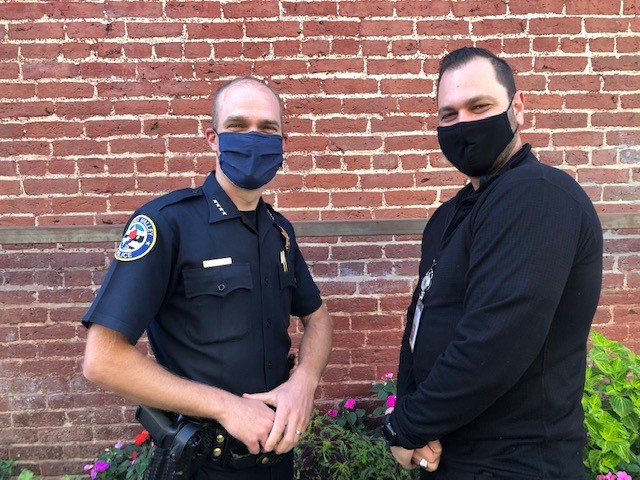Grass Valley Police Department (GVPD) and Hospitality House are leading the charge in a newly developed taskforce that is geared to reduce homeless-related violence while increasing mental health services accessibility to those unsheltered.
The taskforce is made possible through the California Violence Intervention and Prevention (CalVIP) grant program offered by the Board of State and Community Corrections, an award in which Hospitality House and GVPD took first place statewide in the rural set aside. With this grant award, Hospitality House and GVPD will leverage the Homeless Outreach Team (HOT), a collaborative of several local agencies* that work together to address homelessness, to lessen and/or prevent homeless-related violence through three evidence-informed program components, including:
- Community/Police Trust Building
- Intensive Case Management
- Street Outreach
The proposed strategies will identify homeless individuals who may have a propensity for violence and/or who are the victim of crimes, proactively connect with them, and offer services to help address their mental illness and substance abuse needs. This forward-thinking approach is designed to reduce the number of homeless-related 911 calls and incidents, build trust with homeless individuals, and connect them to the wraparound services they need, including food and emergency shelter.
“At the center of public safety is partnerships and relationships,” said Chief Alex Gammelgard, GVPD. “Last year, we had 394 homeless-related calls, many of which appeared to stem from mental illness and substance use disorder. If we can help people struggling with mental illness and substance use early on, we can reduce the harm they may cause to themselves or others.”
In a recent press release from County of Nevada, the Sheriff’s Office (NCSO) and the Department of Behavioral Health are also launching a mental health-focused outreach program. Hospitality House and GVPD’s partnership differs from NCSO’s program which pairs a deputy and therapist together. While the County’s program centers on mental health calls for the general public, Hospitality House and GVPD will focus specifically on homelessness primarily in the greater Grass Valley area, including non-criminal, mental health calls, but with an accelerated focus on preventive measures—addressing mental health and substance use disorders before calls for service begin. Both programs will work in unison to achieve greater community success together.
The new partnership pairs one full-time dedicated GVPD officer and one full-time Hospitality House case manager with a background in clinical social work, working side by side daily. The case manager will be embedded full time with the police officer, riding in the patrol vehicle, and present in responses to calls related to homelessness. During a call that involves a potentially violent homeless individual, the case worker will assist to de-escalate the situation, utilizing behavioral modification strategies to calm the situation if necessary while the police officer will ensure the team’s safety and assist with other intervention opportunities. Individuals served by this program may accept “up stream” services like substance use treatment or mental health interventions, sometimes in lieu of low-level criminal action. In situations where individuals continue to be a danger to others and themselves, the team will determine if the officer needs to take the person into protective custody.
“It’s important to recognize that not all homeless people are violent or exhibit violent tendencies, but mental illness and substance use disorder are serious conditions that need to be addressed with understanding,” said Nancy Baglietto, executive director of Hospitality House. “Arresting someone experiencing a mental health crisis is not the short-term or the long-term answer. Getting people into treatment and/or connecting them to services so that they can stabilize is a more proactive approach. It more appropriately addresses recovery and the potential to transition into permanent housing.”
The GVPD officer and Hospitality House case manager will visit homeless individuals and other areas between calls to build trust and relationships and provide support. The team will identify homeless individuals who have a substance use disorder or mental illness and who may be at greater high risk of committing a violent act or of being a victim of a violent act.
As a leader in homeless services, Hospitality House continues to partner with local law enforcement where possible to enhance homeless-related interaction on the streets. In 2019, Hospitality House was awarded a highly competitive Commission on Peace Officers Standards and Training (POST) Innovations Grant. The grant gave Hospitality House the ability to create homeless-related curriculum for all California Law Enforcement, and takes a street team approach to assist officers in addressing the complex set of challenges surrounding homelessness and best practices for effective communication with emphasis on chronic homelessness, mental illness, substance abuse and effective alternatives to camping in rural settings. The course also covers homelessness, its causes, its impact on the community, as well as the service system in place in Nevada County. Curriculum development took place over the last year-plus and included participation from GVPD, NCSO, the Nevada City Police Department (NCPD), and Nevada County Behavioral Health. POST curriculum will officially launch in Nevada County this November and will complement and strengthen Hospitality House and GVPD’s new taskforce, also expected to hit the streets next month.
*HOT is a collective operation, involving GVPD, Hospitality House, NCSO, NCPD, Nevada County Behavioral Health, the District Attorney, the Public Defenders Office, Turning Point, Crisis Stabilization Unit, and Dignity Health Sierra Nevada Memorial Hospital. For the last two years, HOT has come together biweekly to address and support homeless-related obstacles together. Marrying GVPD and Hospitality House further together leverages HOT and expands available resources to those in need.

